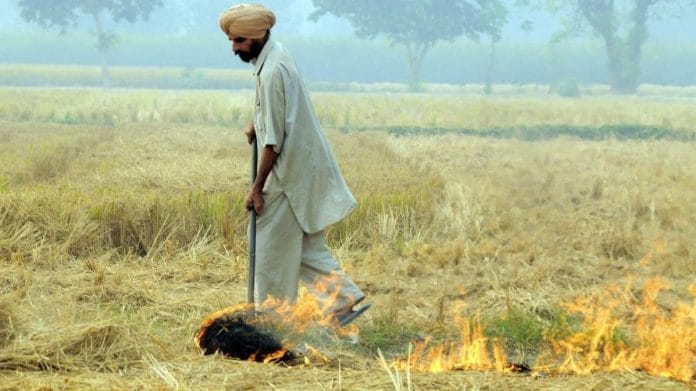Farmers will have to buy ‘super straw management system’ at a subsidised rate; govt sets aside Rs 100 crore in state’s budget presented Saturday.
Chandigarh: The Punjab government has made it mandatory for the state’s farmers to attach a special machine to their self-propelled combine harvesters to facilitate in-situ management of crop residue, an alternative to the pollution-causing practice of paddy straw burning.
Announcing this in his annual budget speech delivered Saturday, state finance minister Manpreet Singh Badal said Rs 100 crore will be set aside for the purpose. The farmers will be able to buy these machines, each of which cost Rs 1.25 lakh, at a subsidised rate.
Burning of paddy stubble following harvesting in October-November in Punjab and Haryana has become a major source of air pollution, which affects all of north India, with Delhi being the worst-hit.
The extent of the problem has increased over the years as harvesting of wheat and paddy has become almost entirely mechanised using a combined harvester. The harvester leaves behind stubble of straw, which farmers choose to burn to prepare the fields for the next crop.
‘A practical action plan’
The finance minister said the method of attaching the super straw management system (SMS) to every self-propelled combined harvester is “practical and achievable action plan”. The super straw management system will replant the leftover straw into the soil (in-situ), which has the additional benefit of improving soil’s quality.
Paddy is grown on 28 lakh hectares of agricultural land in the state generating almost 19.7 million tonne of paddy straw. Of this, almost 22 per cent is used in biomass-based power plants, cardboard mills and as animal fodder. The rest is burnt.
Almost all the paddy in the state is harvested using harvesters, which are rented by farmers from the owners.
“The owners of combine harvesters will now have to purchase the straw management system,” said K.S. Pannu, chairman of the Punjab Pollution Control Board (PPCB), who has been advocating the in-situ method of stubble management for the past few years.
“It costs Rs 1.25 lakh and is available for a group of farmers for an 80 per cent subsidy and for individual farmers at 50 per cent subsidy,” Pannu added.
The PPCB has earlier recommended the same solution but with the government announcing it in the budget speech, the PPCB’s diktat received the requisite political push. The FM said in his speech the burning of paddy straw had come down to 62 per cent of the paddy sown area during the kharif season last year as compared to 85 per cent during the same period in 2016.
The finance minister said primary agriculture cooperative societies (PACS) will now be provided the machines so that farmers can custom-hire them at reasonable rates.
Currently majority of the combine harvesters in Punjab are privately owned. These are hired by farmers for use during the harvesting season.
Ban on straw burning
Paddy straw burning is banned in the state following orders of the National Green Tribunal. The NGT has also listed a host of penalties apart from registration of criminal cases against violators.
However, the farmers are demanding a monetary incentive of Rs 200 per quintal of paddy to stop burning paddy straw. The state government led by chief minister Capt. Amarinder Singh supported the farmers’ demand and had put forth a case to the Centre of paying Rs 100 per quintal bonus to famers to manage paddy stubble.
The centre had recently announced a regional scheme to encourage farmers in Punjab, Haryana, and UP to stop burning paddy straw and take to in-situ management of crop residue.
Punjab will get almost Rs 650 crore under the scheme and will be used to subsidise the buying of the straw management system.






